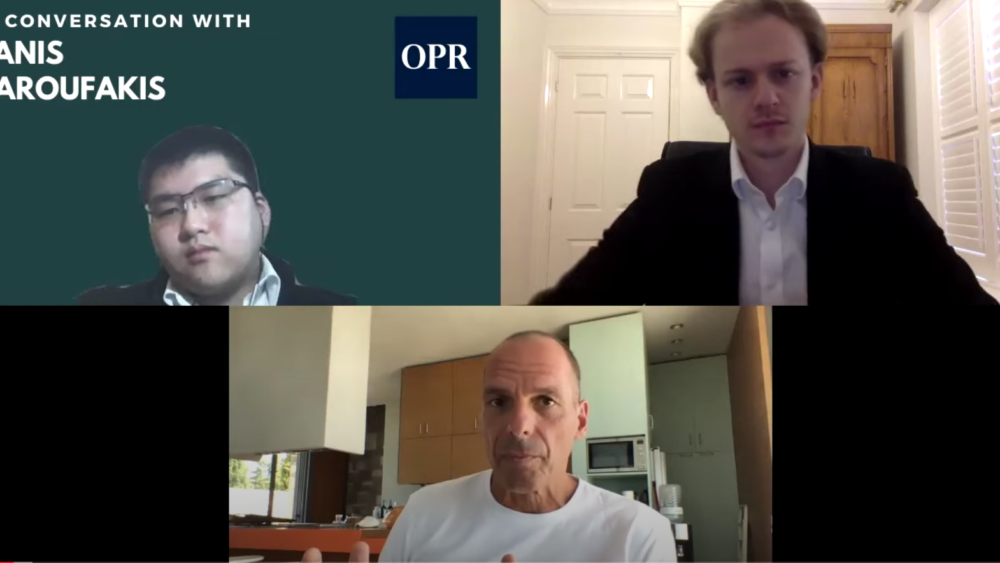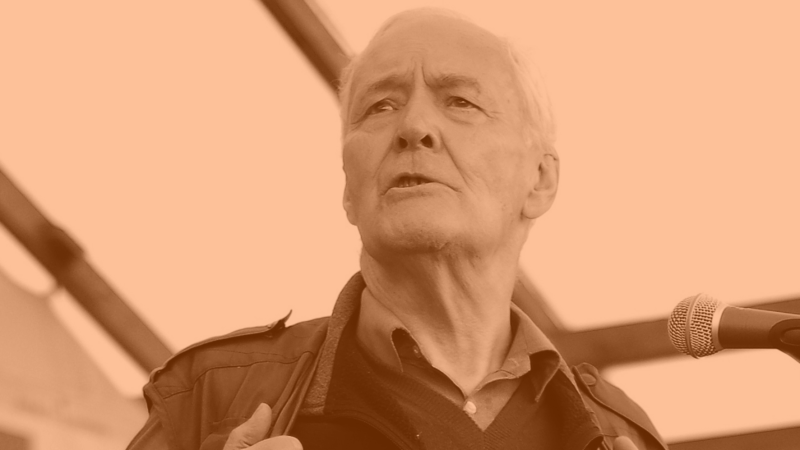The Oxford Political Review interviews Yanis Varoufakis.
The Oxford Political Review (OPR) Editor-in-Chief Brian Wong and Managing Editor Nicholas Leah interviews Professor Yanis Varoufakis. They discuss COVID-19, Brexit, the Eurozone, Austerity, Greek/European politics and Professor Varoufakis’s new book.
Highlights
US and China: Is there a new cold war or is this an overblown hysteria about a natural decoupling between the two largest economies of the world? How will November change things up should Biden be elected?
“The expectation that a Biden victory is going to change things significantly is over-exaggerated. Trump has changed international politics, especially the relations between US and the rest of the world in ways that are in many senses irreversible. From my perspective, what’s happening in the US and China, is a culmination of a class war within China and (…) the US.”
“We’ve reached a situation where the level of public investment in China which has been responsible for floating capitalism globally. (…) working class incomes shrunk as a percentage of national income in China. So you have gigantic growth, an increase in the wealth of the very very few, speculation giving rise to very large rents for the very few in China, therefore an economic model which is based on a relationship with the US where so that China can sustain global capitalism (…) China must be the one that effectively buys into the increasing the public debt of America and at the same time that it is the workshop of companies like Apple so that this thing holds together. At the same time (…) following the implosion of wall street, you had a kind of socialism for the finances.”
Brexit: The UK is now beyond the point where it can extend the transition period, so where does the UK go from here?
“I opposed Brexit, I campaigned against Brexit (…) My remain position was weird in the sense that I was never a cheerleader for Brussels in the EU. My argument was a pragmatic one given that you spent 45 years in the EU, you might as well stay and clash with the Brussels establishment.”
“There’s been developments that have made me rethink my position (…) even after Brexit I was arguing in favor of a Norway plus solution, because of companies like Nissan — my belief was, the moment you have interruptions in the supply chains with checks in Dover, companies like Nissan would immediately divest (…) I was proven wrong. Nissan made the opposite decision. It divested from Romania and Barcelona and from France and has announced massive investment in Newcastle.”
“Even though I was one of those people that predicted that the disruption in trade would be significant and unnecessary from a No Deal agreement, well now that we have COVID-19 two things have happened. Firstly, we’ve already had a huge hit so whatever Brexit does to make things worse is going to be a tiny speck of insignificance compared to what COVID-19 has done to trade and production and to output and to income and to wage and to profits, and so on.”
“I think there is only one thing at issue here in the negotiations between London and Brussels — competition policy; the right of the UK government to sustain and to support local industries. (…) The real issue is the capacity of the government to design an effective industrial policy to support the technologies of the future within Britain and to negotiation with the EU a deal regarding those and not dumping when it comes to labor standards, environmental standards, you know, just straightforward state aid.”
Eurozone: Was the Eurozone ever a sustainable construct? Your forecast for the break up the eurozone?
“It could have been made sustainable, from the beginning, it could have been made sustainable at any point if it added that which has been missing. I’m not against the idea of a common currency — I’m against the idea of a common currency that does not have the inbuilt shock absorbers and institutions which are necessary in order to make it a realm of shared prosperity. The main thing that’s missing in the Eurozone is what I call a Surplus Recycling Mechanism.”
“COVID-19 has the effect of putting all of these discussions on hold — for a very simple reason, the German economy collapsed as well (…) The problem is that the European authorities are not using this time in order to build a system that can be politically resilient. In the end, this is a political decision. (…) The question is political: when will the german political class pull the plug from the European Central Bank (ECB)?”
“The feeling that I get when I’m in Germany these days and I talk to bankers, financiers, industrialists, trade unionists, people on the street, it reminds me distinctly of Britain in 1992; because 1992 was the moment when euroscepticism set in. The roots of Brexit are then, 1991, 1992, with the collapse of the european exchange rate mechanism and thatcher’s opposition to the ECB. The same kind of mumblings that I started hearing in 1992 in Britain I started to hear in Germany.”
Austerity: Why do you think that austerity was or indeed is seen as so appealing by the national governments of Europe? Are you worried that with mounting debt, national governments will turn to the methods of austerity?
“The European governments are doing that because it’s something they have done so often before, it’s the path of least resistance (…) I’m a leftist so normally, under normal circumstances I would very much like to see corporate tax go up, I would very much like to see corporations paying it, not just in theory having a high corporate tax. But I’m not in favor of an increase in any kind of tax now in the UK. Why? It’s the wrong signal in this kind of depression.”
“Capitalism is no longer what it used to be (…) What is fascinating at the moment is that you have the highest level of share prices and lowest level of dividends. Have you noticed that? So profitability is negative, profits are on the floor and share prices are on the ceiling. That’s why I’m saying this is a very weird moment. Taxation is a taxation of dividends. From a left wing point of view what you want to do during the good times is tax profits, but there are no profits in most areas of the economy except Google and Amazon (…) We have the greatest amount of liquidity in the history of capitalism which is being wasted, it’s not going into investment. So before you support any kind of policy whether it is taxation or whatever, ask yourself a basic question: is it going to increase investment in good stuff, good quality jobs (…) I don’t think that reducing taxes or announcing that you are going to an austerity mode is going to do anything to turn this liquidity bubble into an investment drive.”
Do you want to be informed of DiEM25's actions? Sign up here















